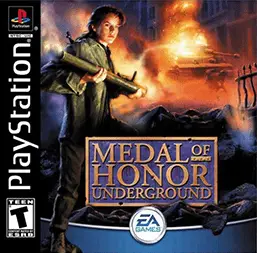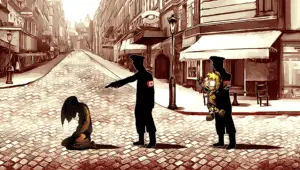WARNING: The following article deals with the Holocaust and will contain topics, quotes and images that may upset or trigger readers. Discretion is advised.
World War II was the largest and most devestating war in human history and has left a permanent scar on the world in nearly every aspect. Among these aspects was media, and specifically, video games. I grew up on WWII themed video games, so now I’ve begun to take a more critical view of how the media treated the war itself.
WWII games have been a hallowed part of gaming since gaming first began, and they still are today. The bloodiest war in human history continues to be portrayed in game after game, with the focus only being suddenly shifted to modern warfare FPS’s in the late 2000’s.
Recently it’s seeing a comeback, with games like Wolfenstein: The New Order/The Old Breed, Battalion 1944, Day of Infamy, the Sniper Elite series, Raid: WW2 and a possible return to roots for the Call of Duty franchise, with a potential WWII game hinted as being in the works.
The recent flood of WWII games rocketed me back to my childhood days of playing Medal of Honor games. In fact, my first FPS was Medal of Honor: Underground for the PS1. These games fueled my interest in the war and helped set me on the path of history buff.

But as I’ve grown older, and my knowledge of the period expanded, I’ve come to realize how incredibly and deeply these games screwed up the popular perception of the war and the Nazis in the minds of the young and modern consuming audience that indulged in them.
In three parts, i will go over how WWII games, due to their shoddy approach to history, have and continue to perpetuate inaccurate and extremely dangerous myths.
The omission of the Holocaust, civilian casualties, and war crimes are a huge problem. So is the erasure of Nazi politics and even the inadvertent glorification of the Nazi war machine as hyper-competent, exceptional, technologicaly advanced and nigh undefeatable. Other forms of media are guilty of these sins as well. But I want to focus primarily on video games.
I’ll spend most of this article debunking the myths these games had perpetuated, with links and quotes from historians, so expect a LOT of history.
So, let’s go.
THE HOLO-WHAT?
Extra Credits already went into this, and others wrote about it, so I’m not the first (and I hope not the last) to talk about the absence of the Holocaust in WWII games.
By erasing the Holocaust from the picture entirely, the presentation of the war changed from one explicitly fueled by the Nazis’ expansionist politics and genocidal racial hatred, to a presentation that simply portrayed the war as a sequence of sterile set piece battles from one corner of Europe to the next.
This presentation is usually void of any larger context or meaning beyond just ‘there was a city called Stalingrad and it got invaded’ or ‘there was a beach called Omaha and the Americans landed there’.
The games simply rely on the gamers to already have an internalized sense of why they’re fighting. That may work to a certain (in my opinion, small) extent, but the true context is easily forgotten if you aren’t reminded.
Seeing the Holocaust, being reminded of it, counts for so much more. Tragedy like that sticks into your head, it’s not easily forgotten and you’re forced to come face to face with what people did to one another: what they’re capable of doing, and what they may do to one another yet again.
Not showing it and then simply assuming people know it’s there, just happening in the background, is an extremely faulty way of talking about the murder of 12 million + people. Wolfenstein: The New Order was the first game I’ve ever seen that was even remotely about WWII that even featured a Jewish character. It took gaming 30 years to do that.

There has been only one game that attempted to portray the Holocaust, a French educational game for the Nintendo DS, and it got shelved due to publishers fears of inciting controversy because of it’s subject matter. As a project it has been dead for a few years at this point, with no sign of it being revived any time soon.
The Holocaust didn’t ‘just happen in the background’, it wasn’t something alien or removed from the war where no one could see it.
The Holocaust began before the war even did. The war was ancillary to the main goal of exterminating the millions Nazis deemed to be unworthy of life.
It developed and gestated over time through Nazi influence, until it formed into the worst act of genocide in human history, and we’re still suffering from it’s effects today. Today, in the late 2010’s, Holocaust denial is disturbingly becoming more and more common and more pronounced.
This isn’t history that can just be erased so efficiently, but more importantly it shouldn’t be.
There is a common belief that ordinary German soldiers and civilians never even knew that the Holocaust was occurring. Video games omitting the event entirely only re-enforces this. It helps whitewash German society at the time, the Wehrmacht, the SS and every other Nazi organization responsible for it, until the Holocaust is just utterly absent from the equation.
This has been proven to be false, several times over. The Holocaust was happening, sometimes in plain view of the civilian populace, and returning soldiers from the front in the Soviet Union would speak of the atrocities they saw or committed there against the local populace. One German officer even photographedthe shootings and showed them to his friends.
The White Rose, an anti-Nazi pacifist organization of students led by Sophie Scholl (who, along with her compatriots, would be executed for their resistance) in Germany certainly knew what was going on, and distributed these pamphlets in 1942.
“We would like to mention by way of example the fact that since Poland was conquered, three hundred thousand Jews have been murdered in that country in the most bestial manner imaginable. In this we see a terrible crime against the dignity of mankind, a crime that cannot be compared with any other in the history of mankind.“
In a diary he kept during the war, Friedrich Kellner wrote of soldiers returning from the front describing the war crimes they had seen and commited.
Erasing the Holocaust and other Nazi war crimes from the picture in WWII games paints the Wehrmacht as an apolitical identity. It portrays the German soldiers as just being kind of… there.
The German soldiers, from day one, were inculcated with the belief that the struggle of the German people was fundamentally an apocalyptic struggle against the encroaching and destructive powers of ‘Judeo-Bolshevism‘. The Germans had to destroy the Jewish faith and their Slavic slaves in the East fully, so that the land can then be populated by pure Aryans.

German soldiers were indoctrinated into this, for decades at that point. They went at it fully believing they were fighting literal inhuman monsters. They performed with gusto.
The East needed to be cleansed fully of all ‘inhuman vermin’. This was explicitly a racial war. German soldiers were told to treat any and all opposition as being explicitly influenced by a nefarious Jewish force. The only solution to this was extermination with extreme prejudice. It wasn’t just the SS that were involved: ordinary soldiers, police, railroad and factory workers, teachers, professors and thousands of other civilians were involved in making the Holocaust a reality.
“Hitler exterminated the Jews of Europe. But he did not do so alone. The task was so enormous, complex, time-consuming, and mentally and economically demanding that it took the best efforts of millions of Germans… All spheres of life in Germany actively participated: Businessmen, policemen, bankers, doctors, lawyers, soldiers, railroad and factory workers, chemists, pharmacists, foremen, production managers, economists, manufacturers, jewelers, diplomats, civil servants, propagandists, film makers and film stars, professors, teachers, politicians, mayors, party members, construction experts, art dealers, architects, landlords, janitors, truck drivers, clerks, industrialists, scientists, generals, and even shopkeepers—all were essential cogs in the machinery that accomplished the final solution.”– Konnilyn G. Feig
The Wehrmacht itself was completely complicit in the Holocaust and the countless atrocities against populations that the Nazi government deemed a threat due to their ‘inferior genes’. They were serving a government with an explicit, openly genocidal agenda. The Army and all it’s cohorts were expected to follow suit.
The Holocaust would not have been as big as it was had it not been helped along by the armed forces and thousands of civilians.
All of this is absent from, to my recollection, almost every WWII game on the market.
Again, the games assume we’d all just fill in the blanks ourselves and didn’t bother going into topics they’d considered to be disruptive of the player’s enjoyment. But turning WWII into something enjoyable definitely is a problem in and of itself that requires debate and conversation.
The games simply erase and whitewashe the nature of the war. The Nazis became more of an aesthetic force than a political one, a nebulous ‘evil’ that is identified more by the trappings (the swastika, black uniforms, the helmets, the jackboots) than by the actual substance of their beliefs.
We saw almost nothing of this in games until recently, with the release of Wolfenstein: The New Order, which took the step to finally talk about and portray the Holocaust and Nazi racial politics. They’re front and center, not hidden, or just alluded to. The extermination of the physically handicapped and mentally disabled. The oppression, enslavement, extermination end internment of Africans, Slavs and Jewish folk. The extermination of gender non-comforming and LGBTQ folk. The plundering of Jewish cultural items and the erasure of their history. All of these things are laid bare, naked, and ugly as they were and still are.

There’s a reason that W:TNO stood out from most, if not almost all FPSs released that year.
But it shouldn’t have taken us this long to take that step. Certainly not 30 years.
The stories of people most affected by the Holocaust have been left out entirely. The victims of the Holocaust were simply swallowed up by the demands for shallow and ephemeral joy that FPSes provide. To ignore the reality of the Holocaust is to ignore and whisk away the circumstances of the times that led to the war in the first place. Even today, younger people are woefully uninformed about it, and having one of the largest mediums ignoring this is, in my opinion, detrimental.
It’s even allowed an intellectual space to Nazi apologists, who can commonly be seen on forums for various WWII games like Red Orchestra, War Thunder and World of Tanks. The erasure of the Holocaust from WWII games utterly depoliticized the Nazis while giving that ground to various Nazi apologists who’s main concern is to whitewash, rehabilitate and absolve the Wehrmacht of the crimes they were complicit in. Clearly, omitting this history has very real and dangerous consequences.
The war and the Holocaust is slowly moving away from being living memory. The idea that one of the most popular story telling mediums in existence will keep ignoring history and sentence those memories and experiences to obscurity is a troubling one. As we love to say at The Fandomentals, stories matter. This is one that needs to continue to be told, and in the right way.

